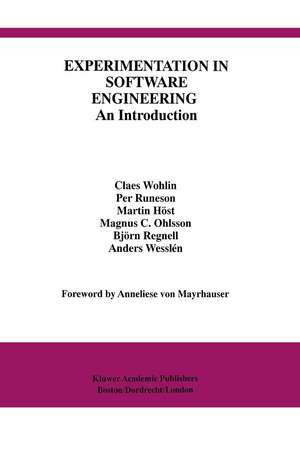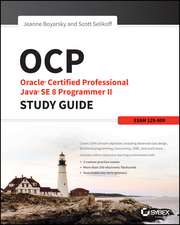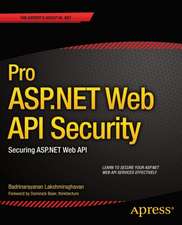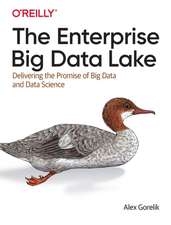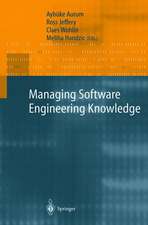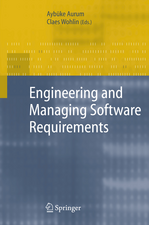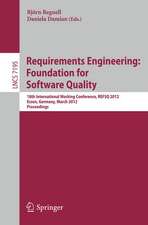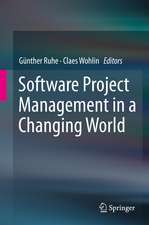Experimentation in Software Engineering: An Introduction: International Series in Software Engineering, cartea 6
Autor Claes Wohlin Cuvânt înainte de Anneliese von Mayrhauser Autor Per Runeson, Martin Höst, Magnus C. Ohlsson, Björn Regnell, Anders Wesslénen Limba Engleză Paperback – 28 oct 2012
| Toate formatele și edițiile | Preț | Express |
|---|---|---|
| Paperback (3) | 329.11 lei 6-8 săpt. | |
| Springer Us – 28 oct 2012 | 329.11 lei 6-8 săpt. | |
| Springer Berlin, Heidelberg – 18 iul 2014 | 341.62 lei 38-45 zile | |
| Springer Berlin, Heidelberg – 5 sep 2024 | 476.08 lei 38-45 zile | |
| Hardback (1) | 536.22 lei 6-8 săpt. | |
| Springer Berlin, Heidelberg – 17 iun 2012 | 536.22 lei 6-8 săpt. |
Preț: 329.11 lei
Preț vechi: 411.39 lei
-20% Nou
Puncte Express: 494
Preț estimativ în valută:
62.98€ • 65.26$ • 52.56£
62.98€ • 65.26$ • 52.56£
Carte tipărită la comandă
Livrare economică 21 martie-04 aprilie
Preluare comenzi: 021 569.72.76
Specificații
ISBN-13: 9781461370918
ISBN-10: 1461370914
Pagini: 228
Ilustrații: XX, 204 p.
Dimensiuni: 155 x 235 x 12 mm
Greutate: 0.33 kg
Ediția:Softcover reprint of the original 1st ed. 2000
Editura: Springer Us
Colecția Springer
Seria International Series in Software Engineering
Locul publicării:New York, NY, United States
ISBN-10: 1461370914
Pagini: 228
Ilustrații: XX, 204 p.
Dimensiuni: 155 x 235 x 12 mm
Greutate: 0.33 kg
Ediția:Softcover reprint of the original 1st ed. 2000
Editura: Springer Us
Colecția Springer
Seria International Series in Software Engineering
Locul publicării:New York, NY, United States
Public țintă
ResearchCuprins
1 Introduction.- 1.1 Software engineering context.- 1.2 Science and software engineering.- 2 Empirical strategies.- 2.1 Overview of empirical strategies.- 2.2 Surveys.- 2.3 Case studies.- 2.4 Experiments.- 2.5 Empirical strategies comparison.- 2.6 Empiricism in a software engineering context.- 3 Measurement.- 3.1 Basic concepts.- 3.2 Measurements in software engineering.- 4 Experiment process.- 4.1 Variables, treatments, objects and subjects.- 4.2 Process.- 5 Definition.- 5.1 Define experiment.- 5.2 Example.- 5.3 Summary.- 6 Planning.- 6.1 Context selection.- 6.2 Hypothesis formulation.- 6.3 Variables selection.- 6.4 Selection of subjects.- 6.5 Experiment design.- 6.6 Instrumentation.- 6.7 Validity evaluation.- 6.8 Detailed description of validity threats.- 6.9 Priority among types of validity threats.- 7 Operation.- 7.1 Preparation.- 7.2 Execution.- 7.3 Data validation.- 8 Analysis and interpretation.- 8.1 Descriptive statistics.- 8.2 Data set reduction.- 8.3 Hypothesis testing.- 9 Presentation and package.- 9.1 An experiment report outline.- 10 Literature survey.- 10.1 Inspection experiments.- 10.2 Other experiments in Software Engineering.- 10.3 Resources.- 11 Example: Experiment process.- 11.1 Definition.- 11.2 Planning.- 11.3 Operation.- 11.4 Analysis and interpretation.- 11.5 Summary and conclusions.- 12 Example: C versus C++.- 12.1 Introduction and problem statement.- 12.2 Experiment planning.- 12.3 Analysis and interpretation.- 12.4 Conclusions and further work.- 13 Exercises.- 13.1 Understanding.- 13.2 Training.- 13.3 Reviewing.- 13.4 Assignments.- Appendix A: Statistical tables.- Appendix B: Experiment process overview.- References.- About the authors.
Recenzii
`This is a well written and concise book, which provides the reader with the essentials necessary to design, conduct and analyse a software engineering experiment. Its value lies in that it is specifically written for the software engineering field, and has surveyed the major contributions by a number of leading researchers in this area. A `how to' book is always welcome, both as a useful starting point to the inexperienced and as a helpful reference and reminder of best practice to others.'
Software Testing Verification and Reliability, 11 (2001)
Software Testing Verification and Reliability, 11 (2001)
Notă biografică
CLAES WOHLIN is Professor Emeritus of software engineering at Blekinge Institute of Technology. He has been conducting empirical research, together with his PhD students, with industrial partners for 35 years. His research focuses on empirical methods in software engineering, software processes and software quality. He served as Editor-in-Chief for the Journal of Information and Software Technology for 14 years. In 2011, he was elected as a member of the Royal Swedish Academy of Engineering Sciences.
PER RUNESON is a professor of software engineering at Lund University. He has more than 25 years of experience in conducting empirical research with PhD students, and leading industry-academia collaboration programs, aiming to understand and improve practice. His research interests embrace cross-disciplinary approaches and include empirical studies on software testing and ecosystems for open data and software, in industrial software and AI engineering. He has advanced the research field through methodology guidebooks on experimentation and case studies.
MARTIN HÖST is a professor of software engineering at Malmö University, where he is dean of the Faculty of Technology and Society. He has about 30 years of experience in empirical research in software engineering, often conducted in collaboration with industry. His research interests include software quality and open source software, as well as empirical research methods in software engineering research.
MAGNUS C. OHLSSON has focused on the development and quality assurance of software for almost 25 years, and today, he is a Quality Strategist and Evangelist at System Verification, specialising in process improvement. He has experience in several different technical areas such as embedded systems, medical devices, mobile network signalling and ERP systems. He is also an appreciated lecturer at different universities and when providing presentations at various conferences.
BJÖRN REGNELL is Professor of software engineering at Lund University. He has over 30 years of experience in software engineering with focus on empirical research in software requirements engineering. He served as Vice Dean of Research at the Faculty of Engineering with focus on quality of graduate level education. He is a member of the editorial board of the Requirements Engineering journal (Springer-Nature). He is also engaged in the governing committee of the Scala open-source programming language.
ANDERS WESSLÉN is an expert at Ericsson in Lund. He has more than 20 years of experience working with system development for both mobile phones and radio base stations. His focus is system-wide architectures and future computing platforms.
PER RUNESON is a professor of software engineering at Lund University. He has more than 25 years of experience in conducting empirical research with PhD students, and leading industry-academia collaboration programs, aiming to understand and improve practice. His research interests embrace cross-disciplinary approaches and include empirical studies on software testing and ecosystems for open data and software, in industrial software and AI engineering. He has advanced the research field through methodology guidebooks on experimentation and case studies.
MARTIN HÖST is a professor of software engineering at Malmö University, where he is dean of the Faculty of Technology and Society. He has about 30 years of experience in empirical research in software engineering, often conducted in collaboration with industry. His research interests include software quality and open source software, as well as empirical research methods in software engineering research.
MAGNUS C. OHLSSON has focused on the development and quality assurance of software for almost 25 years, and today, he is a Quality Strategist and Evangelist at System Verification, specialising in process improvement. He has experience in several different technical areas such as embedded systems, medical devices, mobile network signalling and ERP systems. He is also an appreciated lecturer at different universities and when providing presentations at various conferences.
BJÖRN REGNELL is Professor of software engineering at Lund University. He has over 30 years of experience in software engineering with focus on empirical research in software requirements engineering. He served as Vice Dean of Research at the Faculty of Engineering with focus on quality of graduate level education. He is a member of the editorial board of the Requirements Engineering journal (Springer-Nature). He is also engaged in the governing committee of the Scala open-source programming language.
ANDERS WESSLÉN is an expert at Ericsson in Lund. He has more than 20 years of experience working with system development for both mobile phones and radio base stations. His focus is system-wide architectures and future computing platforms.
Textul de pe ultima copertă
This textbook, which has become the leading source for empirical software engineering research through its earlier editions, provides an in-depth introduction to experimentation in software engineering. The focus is on the steps to go through when conducting experiments. It also introduces a structure for selecting a research design and an introduction to systematic literature reviews, surveys, and case study research. Experiments are valuable tools for all software engineers who evaluate and choose between different solutions, methods, techniques, languages, and tools.
The book has three main parts. Part I introduces empirical research through a structure for selecting a research design and explains several essential areas related to empirical research. Moreover, it provides introductions to systematic literature reviews, experiments, surveys, and case studies. Part II devotes one chapter to each of the five experiment steps: scoping, planning, execution, analysis, and result presentation. Part III completes the presentation with two examples. Assignments and statistical material are provided in appendices. The book provides indispensable information regarding empirical studies, particularly for experiments, but also for systematic literature studies, surveys, and case studies. This new edition comprises substantial new material. This includes a chapter on selecting a research design, which helps put experimentation into a broader context of other research approaches. Furthermore, a new chapter on survey research has been added. Novel contributions concerning A/B testing, replications, open science, validity threats, paired comparison design and tools for statistical analysis have been added. Moreover, systematic literature studies, experiments, and case study research descriptions have been consolidated. The book has also been updated based on the evolution of software engineering since the previous edition's publication.
The book is intended for students, teachers, researchers, and practitioners who would like to compare different options, for example, feature designs, or different development methods, techniques, languages, or tools. Teachers can use the book for undergraduate or graduate students; the book can be used as a course book on experimentation and empirical studies in general. Researchers will also benefit from the book by learning more about how to conduct empirical studies. Likewise, practitioners may use it as a “cookbook” when evaluating different solutions, alternatively for evaluating new methods or techniques before implementing them in their organisation.
The book has three main parts. Part I introduces empirical research through a structure for selecting a research design and explains several essential areas related to empirical research. Moreover, it provides introductions to systematic literature reviews, experiments, surveys, and case studies. Part II devotes one chapter to each of the five experiment steps: scoping, planning, execution, analysis, and result presentation. Part III completes the presentation with two examples. Assignments and statistical material are provided in appendices. The book provides indispensable information regarding empirical studies, particularly for experiments, but also for systematic literature studies, surveys, and case studies. This new edition comprises substantial new material. This includes a chapter on selecting a research design, which helps put experimentation into a broader context of other research approaches. Furthermore, a new chapter on survey research has been added. Novel contributions concerning A/B testing, replications, open science, validity threats, paired comparison design and tools for statistical analysis have been added. Moreover, systematic literature studies, experiments, and case study research descriptions have been consolidated. The book has also been updated based on the evolution of software engineering since the previous edition's publication.
The book is intended for students, teachers, researchers, and practitioners who would like to compare different options, for example, feature designs, or different development methods, techniques, languages, or tools. Teachers can use the book for undergraduate or graduate students; the book can be used as a course book on experimentation and empirical studies in general. Researchers will also benefit from the book by learning more about how to conduct empirical studies. Likewise, practitioners may use it as a “cookbook” when evaluating different solutions, alternatively for evaluating new methods or techniques before implementing them in their organisation.
Caracteristici
The premiere book on how to systematically conduct and evaluate experiments in software engineering The authors are an experienced team of researchers and practitioners with more than eighty years of combined experience with empirical studies Self-contained presentation of experimentation and its process steps, and enriched by chapters on case studies and systematic literature reviews Includes supplementary material: sn.pub/extras
